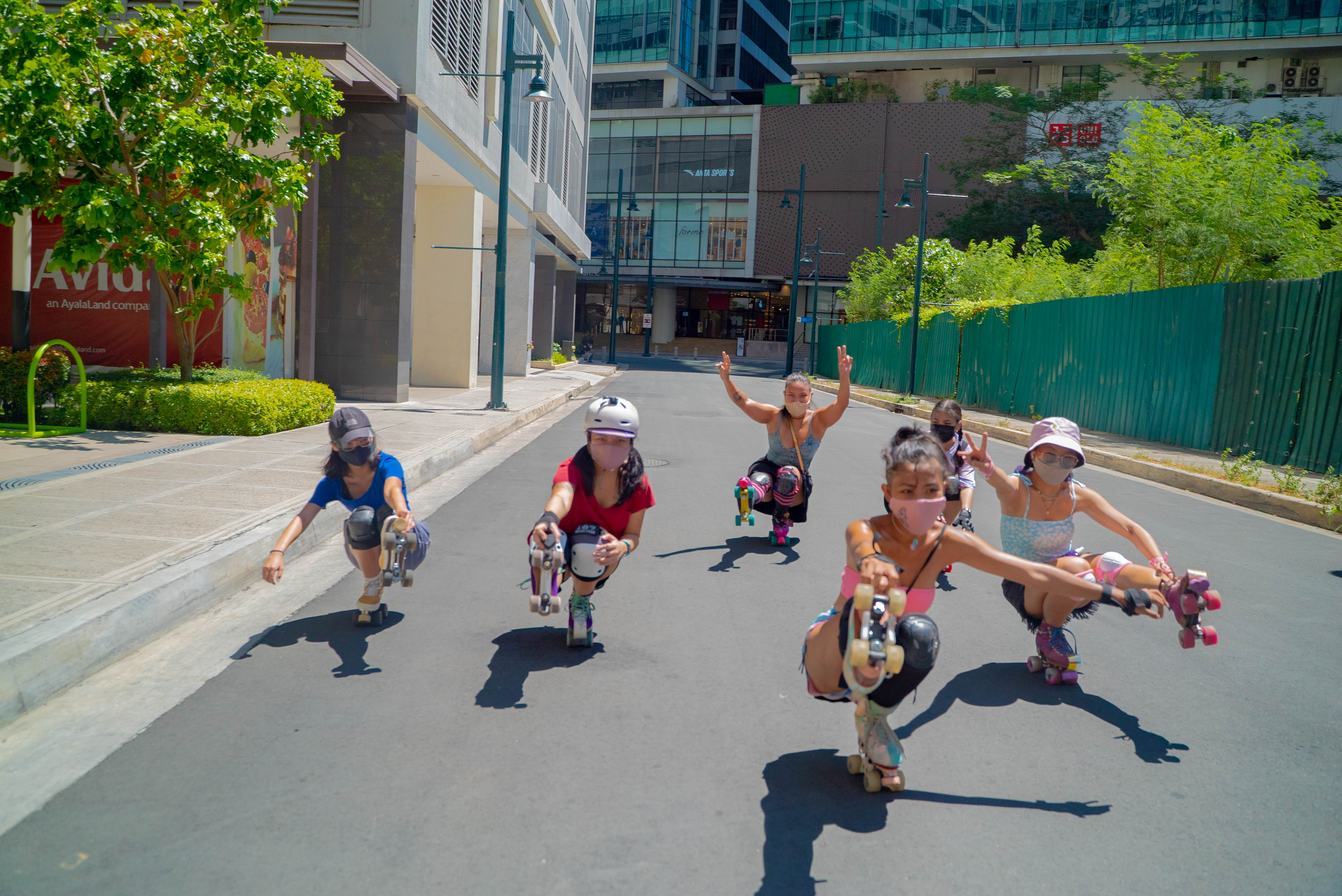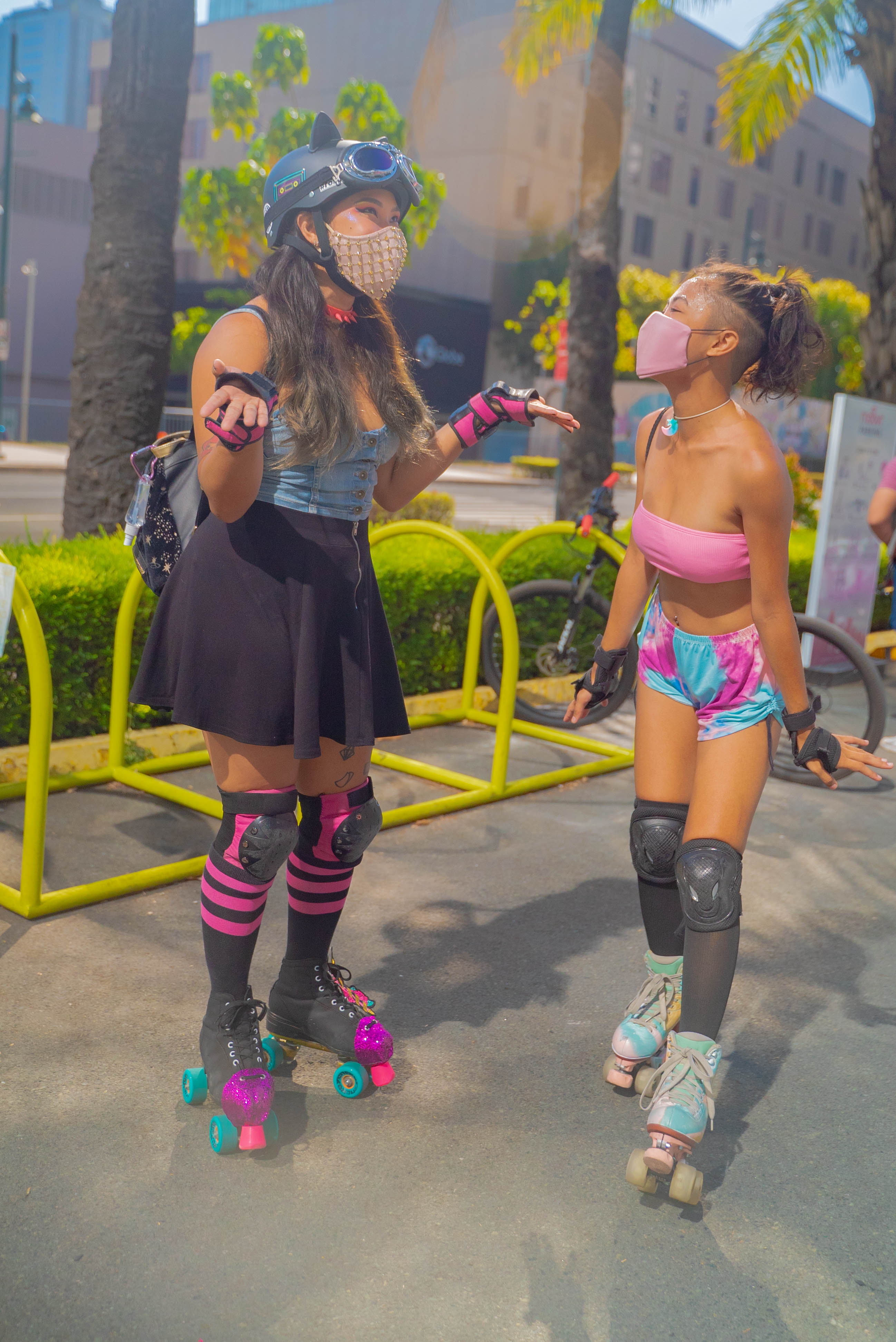“Rolling away from my problems like,” Chai Timbungco, 29, wrote in a video that shows her gliding on a paved road on skates fitted with luminescent wheels, wind in her hair and shades of a post-sunset blue sky as her backdrop.
This is a familiar sight on TikTok, where similar clips of people elegantly cruising along boardwalks and suburban streets have gone viral worldwide in the past year. The only difference is that Timbungco isn’t in a Berlin open park or the Santa Monica Pier. She’s at a newly opened road in Quezon City, Philippines, where roller skating is the latest wheeled sport to trend among millennials and Gen Z.
Videos by VICE
The caption to her video is fitting in a country where a slow-moving pandemic response has forced many of its citizens to stay indoors. Living in a place with one of the longest lockdowns in the world, many young professionals like Timbungco have turned to different hobbies to cope. And while some find respite in handicrafts like pottery or knitting, others have turned to outdoor sports like cycling and roller skating as temporary escapes from their realities.

A copywriter and social media manager for an advertising agency, Timbungco got into roller skating at the start of the pandemic. While she has dabbled in rollerblading on and off, it was only recently that she took the leap and bought a pair of roller skates. Roller skates (also called quad skates) have two trucks and four wheels, while roller blades (also called inline skates) have one central frame and a line of wheels. Now an adult, Timbungco wanted to try her hand at the former.
“When I was growing up, I’d always hear ‘Ah, the streets aren’t nice’ or ‘You’ll break your bones.’ So, for lack of a better term, there never really was that support [for my skating],” she said.
These days, Timbungco finds that much-needed support at monthly rollouts with skate friends she met through Everywhere We Skate PH (EWSPH), an online community she founded in June last year with Cloe Cabral, 20, and Pat Epistola, 18. The three initially met online through a local Facebook group for inline skating. A post led to a group chat to buy roller skates from Hong Kong, which then became the seed for EWSPH.

The decision to form a separate Facebook group for roller skating came from the trio’s desire to create a more nurturing and welcoming environment for skaters of all levels.
“There’s a tendency for some guys in other [Facebook] groups to brag,” said Timbungco of some of the posts and comments she used to see in male-dominated groups. “When in reality, we just want help. I don’t need to be told to stick with inline skates instead of quads.”
The current EWSPH team, composed of Timbungco, Cabral, and members-turned-group admins Raqs Regalado, 37, and Adrian Duarte, 24, are in charge of maintaining order in the group and coming up with different activities to build the skate community.
Upon joining, members get access to a document with everything they’ll need to know as a beginner—from shops to check out, to guides on skate sizing, parts, safety gear, and more. Posts are generally very welcoming, with members hyping each others’ videos up, asking for skate companions in their area, or just asking for advice.

Now at over 6,000 members, the community welcomes skaters of all ages, sexualities, and gender identities all over the Philippines, with several location-based factions including Metro Manila, Pampanga, and Cebu. There’s the Skatebomb Girls, the East Siders Roller Skaters, the South Skaters, and the Wheel Wreckerz, just to name a few. Most of the members didn’t know each other prior to joining but one thing that unites them is their love of roller skating.
Popularized by Black creators on TikTok who were heavily influenced by retro fashion, a lot of the appeal comes from customizing skates and matching outfits. While dressing up isn’t required, many skaters like to have fun by styling clothes they’re comfortable skating in.
“I think the dressing up part as a skater is part of the expression,” said Duarte. “For me, being on wheels makes me feel free and I love to wear outfits that are flowy and chic.”
Cabral added that a lot of skaters go with their own signature style, which is why many roll out in bright outfits. Squads also have occasional themed rollouts. Some dress themes their community has done include pastel, black, tropical, and Halloween costumes.
Since mass gatherings are banned and human interaction is hard to come by, rollouts are, for many members, the only way to meet new people.
“With skate, you don’t need to touch anyone, and we’re outdoors. It’s just a good hobby to get together,” said Duarte.
Due to the lack of infrastructure for roller-based activities in the Philippines, most roller skaters are limited to practicing in their own homes or at basketball courts and city streets. When the group admins started organizing regular rollouts, they made sure to check local government restrictions and email officials to ask about what could and couldn’t be done.

“There’s also a stigma of skater boys who are rowdy, who damage property when they do tricks,” Regalado said about how security guards and other authorities assume the same about them. “That’s what we want to change. We’re not trying to be punks. We just want to skate.”
For EWSPH’s Metro Manila chapter, the challenge is finding good skate spots in the densely populated city. There aren’t many accessible skate parks in the area, so it’s common to travel a bit to empty parking lots in Bonifacio Global City in Taguig and The Bike Playground in Quezon City.
On a regular day, these gatherings are unstructured, usually sparked by one person asking who is up to skate and chat. A typical rollout in the pandemic age has them agreeing on a place, with some members leading and others serving as sweepers, or people whose primary role is to make sure no one gets left behind. Oftentimes, they wind down by teaching each other tricks and choreography while exchanging tips.
“We used to overthink them, asking ourselves ‘Should we have attendance sheets? A buddy system?’ and stuff like that,” said Cabral. But for now, the strictest rules involve health protocols. A pinned post on the group cautions skaters to “wear your mask, social distance, bring [disinfectant] alcohol,” among other things. They also advise anyone who isn’t feeling well to stay home.

But there’s something else that skating has brought to the community: the group’s admins say it has helped improve their mental health and encouraged them to take risks.
“Skating makes me forget a little of the world. [As] cliché as it is, it’s liberating for us,” Duarte said. “It’s uplifting to see that people are coming together and getting together during these times.”
Cabral finds it funny that she’s found friends she can trust during a time when most people can’t see each other in person.
“It’s a kind of unconventional set-up as friends because you can just hit each other up and say ‘let’s skate’ even if you don’t talk to each other much. Skate friends are something else,” she said.

With the sport becoming more accessible and the demand for skates growing (more brands are coming in as local stocks are always sold out), Timbungco and Cabral believe that this is more than a passing trend. They both hold on to the dream that more accessible roller rinks and skate parks will open up when it becomes safer to go out.
“There are skaters who are branching out into specific kinds of skating, building their own set-ups,” said Timbungco. “If and when it becomes safer, I see [roller skating] classes happening. Maybe we can even have a roller derby.”
As the community grows, the group hopes that the atmosphere remains cooperative and not competitive, and that new skaters extend the same kindness to those wanting to get into the hobby.
“If you encourage somebody, it really opens a lot of doors for that [person],” said Timbungco. “It’s a community, so the true essence of the community is what we’re trying to bring out.”
More
From VICE
-

Universal History Archive/Universal Images Group/Getty Images -

Mat Hayward/Getty Images -

David McNew/Contributor/Getty Images -

Inger Vandyke /VW PICS/Universal Images Group/Getty Images
